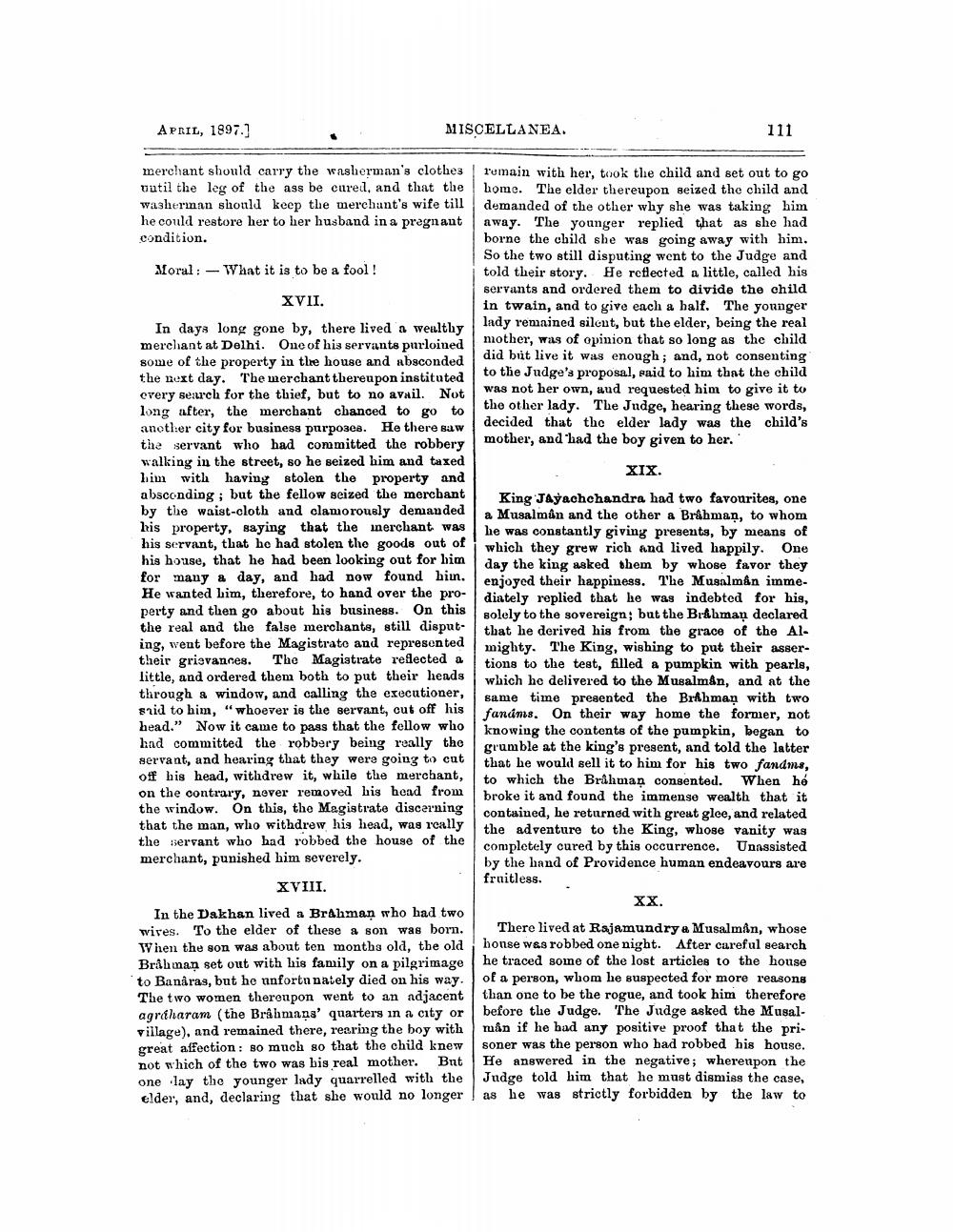________________
APRIL, 1897.]
MISCELLANEA.
111
merchant should carry the washerman's clothes uutil the leg of the ass be cured, and that the washerman should keep the merchant's wife till he could restore her to her husband in a pregnant condition.
Moral: - What it is to be a fool!
XVII.
In days long gone by, there lived a wealthy merchant at Dolhi. One of his servants purloined some of the property in the house and absconded the next day. The merchant thereupon instituted cvery search for the thief, but to no avail. Not long after, the merchant chanced to go to another city for business purposes. He there saw the servant who had committed the robbery walking in the street, so he seized him and taxed him with having stolen the property and absconding ; but the fellow seized the merchant by the waist-cloth and clamorously demanded his property, saying that the inerchant was his servant, that he had stolen the goods out of his house, that he had been looking out for him for many a day, and had now found him. He wanted him, therefore, to hand over the property and then go about his business. On this the real and the false merchants, still disputing, went before the Magistrate and represented their grievances. The Magistrate reflected a little, and ordered them both to put their heads through a window, and calling the executioner, snid to him, "whoever is the servant, cut off his head." Now it came to pass that the fellow who had committed the robbery being really the servant, and hearing that they were going to cut off his head, withdrew it, while the merchant, on the contrary, never removed his head from the window. On this, the Magistrate discerning that the man, who withdrew his head, was really the servant who had robbed the house of the merchant, punished him severely.
XVIII.
romain with her, took the child and set out to go home. The elder thereupon seized the child and demanded of the other why she was taking him away. The younger replied that as she had borne the child she was going away with him. So the two still disputing went to the Judge and told their story. He reflected a little, called his servants and ordered them to divide the child in twain, and to give each a half. The younger lady remained silent, but the elder, being the real mother, was of opinion that so long as the child did but live it was enough ; and, not consenting to the Judge's proposal, said to him that the child was not her own, and requested him to give it to the other lady. The Judge, hearing these words, decided that the elder lady was the child's mother, and had the boy given to her.
XIX. King Jayachchandra had two favourites, one a Musalman and the other a Brahman, to whom he was constantly giving presents, by means of which they grew rich and lived happily. One day the king asked them by whose favor they enjoyed their happiness. The Musalman immediately replied that he was indebted for his, solely to the sovereign; but the Brahmaṇ declared that he derived his from the grace of the Almighty. The King, wishing to put their assertions to the test, filled & pumpkin with pearls, which he delivered to the Musalman, and at the same time presented the Brahman with two fanums. On their way home the former, not knowing the contents of the pumpkin, began to grumble at the king's present, and told the latter that he would sell it to him for his two fandms, to which the Brahman consented. When he broke it and found the immense wealth that it contained, he returned with great glee, and related the adventure to the King, whose vanity was completely cured by this occurrence. Unnssisted by the hand of Providence human endeavours are fruitless.
xx. There lived at Rajamundry a Musalman, whose honse was robbed one night. After careful search he traced some of the lost articles to the house of a person, whom he suspected for more reasong than one to be the rogue, and took him therefore before the Judge. "The Judge asked the Musalman if he had any positive proof that the prisoner was the person who had robbed his house. He answered in the negative; whereupon the Judge told him that he must dismiss the case, as he was strictly forbidden by the law to
In the Dakhan lived a Brahman who had two wires. To the elder of these a son was born. When the son was about ten months old, the old Brahman set out with his family on a pilgrimage to Banaras, but he unfortunately died on his way The two women thereupon went to an adjacent agraharam (the Brahmans' quarters in a city or village), and remained there, rearing the boy with great affection: so much so that the child knew not which of the two was his real mother. But one lay the younger lady quarrelled with the elder, and, declaring that she would no longer




